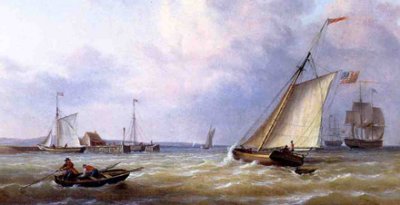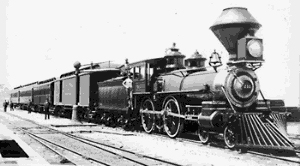|
Justice Curtis, in Cooley v Board of Wardens (1851) outlines the case for recognizing, as a constitutional matter, zones of exclusive federal authority over commerce and other zones of concurrent state and federal authority. Cooley, upholding a Pennsylvania law requiring that vessels entering Philadelphia harbor use of local pilots, applies a balancing test to judge the validity of the regulation. Baldwin v G. A. F. Seelig (1935) invalidated a New York law prohibiting the sale in the state of New York of milk bought outside of New York. New York argued the law was necessary to avoid price competition that would drive dairies into producing less wholesome milk. The Court, more realistically, saw the law as protectionist. Justice Cardozo wrote that when "a state tries to isolate itself economically" it must show an important interest for doing so and that it had no less discriminatory mean open for accomplishing its goal. Cardozo's test has become the standard test for evaluating state laws that discriminate against out-of-state commerce. In
another New
York milk
case, H. P. Hood and Sons v Dumond (1949),
the Court applied
the Baldwin
test for protectionist laws to the state's denial
of a license to
operate
a depot to collect milk for distribution to
Boston. The Court saw
the license denial as an effort by New York to
horde a resource and
thereby
keep prices for its consumers low. Dean Milk Co. v Madison (1951) deals with discrimination against out-of-state (as well as much in-state) commerce not by a state, but by a city. At issue in yet another milk case was a Madison, Wisconsin ordinance that prohibited the sale of milk in Madison that was bottled more than five miles from the city's center. The ordinance was justified by Madison as necessary to facilitate inspection by city dairy inspectors. Finding the ordinance discriminatory and believing that reasonable non-discriminatory alternatives existed, the Supreme Court invalidated the ordinance despite the fact that a Milwaukee dairy was shut out of town just as much as one from Illinois. Edwards v California (1941) considered a challenge to a California law aimed at reducing the influx of dustbowl indigents to the state. The California statute made it a crime to bring into the state any indigent non-resident. Finding people in this case to be "articles of commerce," the majority found the statute to be a form of unconstitutional discrimination against out-of-state commerce. (Four concurring justices would have preferred to invalidate the law on 14th Amendment privileges and immunities grounds.) In Philadelphia v New Jersey (1976), the Court struck down a New Jersey law that prohibited the importation of garbage into the state. Concluding that garbage was "commerce," the Court viewed the law--despite its environmental justification--as unconstitutional discrimination agains out-of-state commerce. The Court held that as long as reasonable, non-discriminatory alternatives exist that serve the states legitimate interests, they must be used instead of a discriminatory ban. In Hughes v Oklahoma (1979), the Court invalidated an Oklahoma law prohibiting the interstate transportation of minnows taken from Oklahoma waters. The Court rejected Oklahoma's law that states "own" wildlife and therefore wildlife is not "an article of commerce." The law could be upheld only if the state could show it served a significant local interest that could not be furthered by a non-discriminatory law--this Oklahoma could not show. Maine
v
Taylor
(1986) is a rare example of a Supeme Court
decision upholding a state
statute
that discriminated against out-of-state
commerce. The Court
accepted
the trial court's findings that no
non-discriminatory alternatives to
Maine's
ban on the importation of live baitfish adequately
served the state's
interest
in preventing the introduction into Maine waters
of new parasites and
non-native
fish species that might upset Maine's ecosystems.
In Hunt
v
Washington
State Apple Ass'n (1977), the Court
determined that a North
Carolina
law that allowed only one grade (the U. S. Dep't
of Agriculture's
grade)
to be placed on containers of apples sold in the
state.
Washington's
State Apple Ass'n contended that the law
discriminated against
Washington
apples which are shipped in containers that
include its own tougher
state
grades. Concluding that a discriminatory
effect (not a
discriminatory
intent) is all that is necessary to trigger the
Baldwin test of a
significant
state interest and no non-discriminatory
alternatives available, the
Court
invalidated North Carolina's apple-grading law. In
National Pork Producers Council v Ross
(2023), the Court, on a vote of 5 to 4, upheld a
California law that prohibited the sale in the
State of pork sold from pigs raised in inhumane
conditions, where the pigs lived their lives
without room to turn around or lie down.
Even though California produces few hogs, and the
burden of the law falls mostly on states (such as
Iowa) with large hog operations, the Court said
that law was non-discriminatory in that the law
applied to whatever few California hog producers
there are as well as hog producers in other
states. Moreover, the Court rejected
applying a balancing test or a new test that would
target just this sort of regulation with primary a
moral aim or benefit. Justice Gorsuch wrote
the Court's opinion.
In the
consolidated cases of Granholm v Heald and Swedenburg v Kelly,
involving
challenges to Michigan and New York laws
respectively, the Supreme
Court considered whether the 21st Amendment gave
states the power to
discriminate against out-of-state liquor
distributers in ways that
would otherwise clearly violate the Commerce
Clause. In its 2005
decision, the Supreme Court, on a 5-4 vote, found
that state laws that
prohibited out-of-state wineries from selling wine
over the Internet
directly to consumers violated the Commerce
Clause. The four
dissenters interpreted Section 2 of the
21st Amendment as giving broad
authority to states to ban such sales. [LINK to Swedenburg
Estate Vineyard website] So.
Pacific
Co. v Arizona
(1945) demonstrates that state laws might violate
the Commerce Clause
even
when in-state and out-of-state commerce are
treated equally. The
case involved a challenge to Arizona's law
prohibiting trains from
crossing
the state that contained more than 70 freight
cars. Southern
Pacific
complained that the law required them to choose
between disassembling
at
the Arizona border larger trains, making two runs
across the state, and
then reassembling the trains or avoiding Arizona
altogether.
Arizona
argued the law was a safety measure designed to
minimize the risk of
"slack
action" accidents to which longer trains are
susceptible. The
Court
applied a test that balanced the state's safety
interest against what
it
saw as the very substantial burden the law imposed
on interstate
commerce.
The law was struck down. The same test was
used in 1959 to strike
down an Illinois law requiring trucks to have
contoured rear fender
mudguards
rather than the straight mud guard flaps required
by most other states
(Bibb v Navajo Freight) and in 1978 to
invalidate a Wisconsin
law
that limited truck length to 55 feet at a time
when most long haul
truck
lines had gone to 65 foot trucks (Raymond Motor
Transportation v Rice).
In United Haulers
Assoc. v Oneida-Herkimer
Solid Waste Management Authority (2007),
the Court, by a vote of
6 to 3, upheld a New York law that required trash
haulers in a region
to deliver their waste to a county-owned waste
treatment
facility. Justice Roberts, writing for the
Court, concluded that
the law not discriminatory because it did not
favor a private
in-state trash facility,
but rather a government-owned facility, and
therein lies a
constitutional difference. The burden of the
"flow control" law,
in the form of more expensive trash service, falls
on in-state
residents and could not be seen as an attempt to
shift costs to
out-of-state businesses. Because the law was
deemed
non-discriminatory, the Court applied its
balancing test and found that
the local benefits of the law (effective financing
of waste disposal
and increased recycling) outweighed the abstract
harm on out-of-state
businesses of removing waste processing services
from the national
marketplace. Our last two cases deal with the "market participant" exception to Commerce Clause analysis. In Reeves v Stake (1980), the Court considered South Dakota's preference for selling cement from its state-owned Dacotah Cement plant to South Dakota customers. Concluding that South Dakota was acting as a market participant rather than as a regulator of commerce, the Court upheld the state's preference for in-state customers. Reeves was distinguished in South-Central Timber Development Inc v Wunnicke (1984), which invalidated Alaska's policy of insisting that high-bidders on state-owned timber agree to process some of the timber they purchased at Alaskan sawmills. The Court saw the bidding rules as an attempt to control commerce "down the stream," and that therefore the state was acting as a regulator, not as a mere market participant. |
Early Case 
Harbor of Philadelphia in the 1840s Cooley v Bd. of Wardens (1851) Discrimination
Against Out-of-State Commerce: The Milk Cases Edwards v California (1941) Philadelphia v New Jersey (1978) Hughes v Oklahoma (1979) Maine v Taylor (1986) Hunt v Wasington State Apple Advertising Comm'n (1977) National Pork Producers Council v Ross (2023) Discrimination Against Out-of-State Commerce: Different Rules for Liquor? (Power of States Under 21st Amendment) Granholm v Heald/ Swedenburg v Kelly (2005)
Facially
Neutral Laws: The Balancing Test
Market
Participant Exception
Questions 1. Which
interpretation of
the Commerce Clause outlined in the introduction
makes the most
sense?
Why? |







